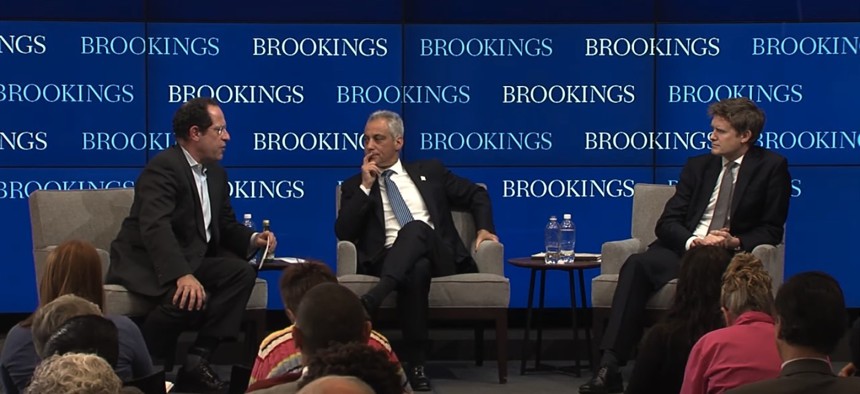Why Cities Must Bridge the Communitarian-Cosmopolitan Divide


Connecting state and local government leaders
That was the message Chicago Mayor Rahm Emanuel and British MP Tristram Hunt had during a Brookings Institution discussion on Friday.
This year's victories for supporters of Donald Trump and Brexit revealed a communitarian-cosmopolitan split in both the U.S. and U.K. that cities are best positioned to mend, according to panelists during a Brookings Institution discussion on Friday.
Chicago Mayor Rahm Emanuel and British MP Tristram Hunt dissected the growing divide between metropolitan and nonmetropolitan areas, pointing out many residents in the latter feel left behind by globalization due to income and education gaps.
Manufacturing jobs are increasingly threatened by automation, an economic reality both the U.S. and U.K. political systems have failed to address, the two panelists agreed.
“We’ve got to understand where people are and how they’re living their lives,” Emanuel said, adding rural residents seemed to vote against their own self-interest with Trump—until you remember that emotion plays a role in politics as well.
Any message of social inclusion after the Trump and Brexit votes must also be economically robust, Emanuel said.
Similarly, in the U.K., there’s a perception in both rural and coastal towns that London is out of touch with the decline in their livelihoods and domestic tourism while the capital takes more than its fair share of infrastructure, money and talent. Hostility toward the European Union was an extension of that, Hunt said.
“As a historian, I never lose sight of, going right back to Rome, the contempt for urban, cosmopolitan elites—and rural virtue versus urban immorality—that has always been there,” he said. “And so this could be another turn of the cycle on that.”
Hunt was optimistic that following populist movements countries often experience progressive moments, but “there needs to be a richer appreciation and understanding of the urgings and frustrations behind these votes” than simply chalking them up to racism or some other catch-all.
Even with the loss of jobs over the growth of tech, cities can actively make choices that ensure new jobs from the ashes, and education is a big part of that.
Chicago has the second-highest number of universities of any U.S. city next to Boston, and Emanuel wants to tap into that research and development capacity. The city is also making coding courses and additional math and science hours requirements for K-12 students
Emanuel said municipal leaders must ask the question: “Can every child, regardless of where they go to school, see that city providing for their future?”
Outside of government, cultural, social and financial institutions must assist in reaching outside metropolitan boundaries to connect with their “hinterlands,” Hunt said. Suburban areas are politically promising because of their progressive leanings, Emanuel added.
The rise of the smart city, in part, is an effort to make government more responsive to a host of issues including infrastructure and transportation.
“Transportation is [not only] a fundamental...job creator today but of job growth going forward,” Emanuel said.
But immigrants brought to this country as children by their parents deserve access to those jobs, he added.
On Wednesday, Emanuel delivered a letter signed by 15 other mayors to President-elect Donald Trump calling for the continuation of the Deferred Action for Childhood Arrivals program protecting such immigrants.
U.S. cities big and small continue to declare themselves sanctuary cities for undocumented immigrants because of how important they are to their local economies.
Cities can only be successful if they open themselves up to global talent, Hunt said, “and yet the [Brexit] vote was about partly pulling the drawbridge up.”
Dave Nyczepir is a News Editor at Government Executive’s Route Fifty and is based in Washington D.C.

NEXT STORY: Undermining the Middle Class in Wisconsin





